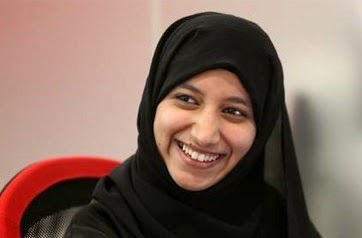 |
| Majeed Abdulhakim, 21 |
Majeed Abdulhakim, 21, is the first student from the university to be awarded the Hamdan bin Rashid Al Maktoum Award for Distinguished Academic Performance.
The award, which comes with a Dh25,000 prize, is made annually to three university students from the UAE who produce research that contributes to the enrichment and understanding of education in the country.
Ms Abdulhakim, an Ajman-born Bangladeshi who is majoring in Islamic studies and Arabic language, studied the impact the Sheikh Mohammed bin Rashid Arabic language initiatives are having in Ajman high schools.
The seven Arabic language initiatives, launched by Sheikh Mohammed, Vice President and Ruler of Dubai, in 2012, led to the formation of an Arabic language charter, an advisory council, a new education facility at Zayed University and competitions to promote and protect the language in an effort to boost national identity.
The initiatives also called for setting up a translation faculty at the Mohammed bin Rashid Media College, a programme to enhance Arabic content online and the establishment of a committee of experts charged with restoring Arabic as the language of science and technology, according to the Ministry of Cabinet Affairs.
Ms Abdulhakim’s research focused on new ways of teaching Arabic. She wanted to find out whether the initiative was having any impact in the classrooms and curricula of public and private high schools in Ajman.
Her survey asked questions of 250 high school teachers in the emirate. Based on the 101 replies received, Ms Abdulhakim concluded that while the initiatives helped raise awareness of the need to bolster Arabic, they have done little to affect curricula or how teachers deliver their everyday lessons.
In answer to the survey question: "Have you applied new teaching techniques as a result of the Arabic language initiatives?", 82 per cent of respondents said they had not.
"It was shocking for me to see that most teachers answered no to this question because it showed that the Arabic-language initiatives didn’t encourage them to improve their teaching method," said Ms Abdulhakim. "So, it didn’t affect them and it did not encourage them to improve their teaching."
Ms Abdulhakim said her findings led her to conclude the government needed to give specific instructions to help teachers implement Arab language initiatives in class.
"The fault is not of the initiative but how it was launched," she said. "The ministry did not communicate the needs or the requirement in order to fulfil the initiatives. They need to be able to communicate exactly how it needs to be done. There was no road map."
There was also good news to come out of Ms Abdulhakim’s survey. It showed that the initiatives increased teachers’ interest in Arabic in general. They also said they had become more interested in participating in Arabic-language activities and it encouraged them to use Arabic more often than English.
Ajman University vice president Osama Saeed Salman praised Ms Abdulhakim’s attempt to measure the impact of the initiatives in classrooms. "Preservation of Arabic is integral to our national identity and cultural heritage," said Mr Salman. "She has shed light on the importance of having a catalyst in place that can translate a vision into reality by providing a road map."
Ms Abdulhakim will be honoured, along with other Hamdan Award recipients, at a ceremony in Dubai on April 22.
She said she will use her prize money to pursue her Master’s degree in education. "I want to make a difference in this field."




0 Comments